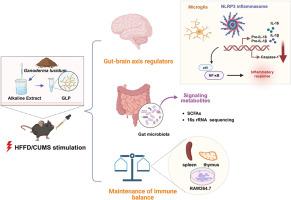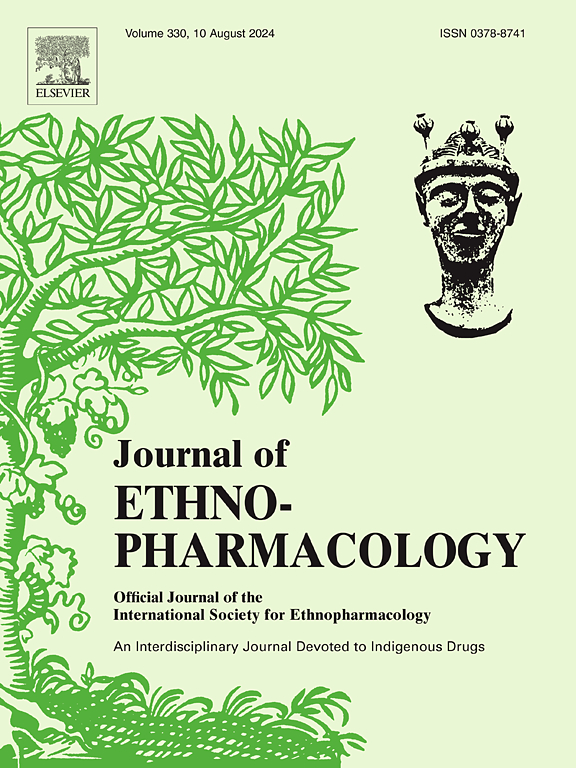Ganoderma lucidum polysaccharide alleviates cognitive dysfunction by inhibiting neuroinflammation via NLRP3/NF-κB signaling pathway
IF 4.8
2区 医学
Q1 CHEMISTRY, MEDICINAL
引用次数: 0
Abstract
Ethnopharmacological relevance
Ganoderma lucidum (G. lucidum), a traditional Chinese medicinal herb, is commonly recommended for its potential to promote mental relaxation and alleviate memory impairment. Recently, there have been reports suggesting that it exhibits anti-neuroinflammatory activity through the gut-brain axis. Cognitive dysfunction is among the most prevalent neurodegenerative diseases.
Aim of the study
This study aimed to investigate the efficacy of polysaccharides extracted from G. lucidum in alleviating cognitive dysfunction.
Methods and materials
A polysaccharide was extracted through the process of alkali extraction followed by alcohol precipitation. Comprehensive analysis was conducted to characterize the total sugar content, amino acid composition, and sugar chain structure. The levels of inflammatory related factors were assessed using griess reagent, qPCR and western blotting assay in vitro. The efficacy of alleviating cognitive dysfunction was evaluated through a series of behavioral studies in mice model induced by the high-fat high-sugar diet combined with chronic unpredictable mild stress (HFFD/CUMS) in vivo. The mechanism was investigated by 16S rRNA sequence, immunohistochemistry, flow cytometry and short-chain fatty acid detection.
Results
Ganoderma lucidum polysaccharide (GLP) is a polysaccharide identified as β-glucan. Bioactivity experiments have demonstrated that GLP possesses the potential to ameliorate cognitive dysfunction. The mechanism study revealed that GLP can modulate the composition of gut microbiota and suppress the activation of inflammasomes via NLRP3/NF-κB signaling pathway, thereby attenuating neuroinflammatory. Furthermore, GLP may enhance the peripheral immunity response of the body, leading to a comprehensive regulatory effect.
Conclusion
A polysaccharide alleviates cognitive dysfunction via inhibiting neuroinflammation.

灵芝多糖通过NLRP3/NF-κB信号通路抑制神经炎症,缓解认知功能障碍
民族药理学意义:灵芝(Ganoderma lucidum)是一种传统的中药材,因其具有促进精神放松和缓解记忆障碍的潜力而被广泛推荐。最近有报告表明,灵芝通过肠道-大脑轴具有抗神经炎活性。认知功能障碍是最常见的神经退行性疾病之一:本研究旨在探讨从鹿角胶中提取的多糖在缓解认知功能障碍方面的功效:方法:采用碱提取、酒精沉淀的方法提取一种多糖。对多糖的总糖含量、氨基酸组成和糖链结构进行了综合分析。在体外使用 griess 试剂、qPCR 和 Western 印迹法评估了炎症相关因子的水平。通过对高脂高糖饮食结合慢性不可预测轻度应激(HFFD/CUMS)诱导的小鼠模型进行一系列行为研究,评估了其缓解认知功能障碍的功效。通过16S rRNA序列、免疫组织化学、流式细胞术和短链脂肪酸检测等方法对其机制进行了研究:灵芝多糖(GLP)是一种被鉴定为β-葡聚糖的多糖。生物活性实验证明,GLP 具有改善认知功能障碍的潜力。机理研究发现,GLP 可调节肠道微生物群的组成,通过 NLRP3/NF-κB 信号通路抑制炎性体的活化,从而减轻神经炎症。此外,GLP 还可增强机体外周免疫反应,从而产生综合调节作用:结论:一种多糖可通过抑制神经炎症缓解认知功能障碍。
本文章由计算机程序翻译,如有差异,请以英文原文为准。
求助全文
约1分钟内获得全文
求助全文
来源期刊

Journal of ethnopharmacology
医学-全科医学与补充医学
CiteScore
10.30
自引率
5.60%
发文量
967
审稿时长
77 days
期刊介绍:
The Journal of Ethnopharmacology is dedicated to the exchange of information and understandings about people''s use of plants, fungi, animals, microorganisms and minerals and their biological and pharmacological effects based on the principles established through international conventions. Early people confronted with illness and disease, discovered a wealth of useful therapeutic agents in the plant and animal kingdoms. The empirical knowledge of these medicinal substances and their toxic potential was passed on by oral tradition and sometimes recorded in herbals and other texts on materia medica. Many valuable drugs of today (e.g., atropine, ephedrine, tubocurarine, digoxin, reserpine) came into use through the study of indigenous remedies. Chemists continue to use plant-derived drugs (e.g., morphine, taxol, physostigmine, quinidine, emetine) as prototypes in their attempts to develop more effective and less toxic medicinals.
 求助内容:
求助内容: 应助结果提醒方式:
应助结果提醒方式:


